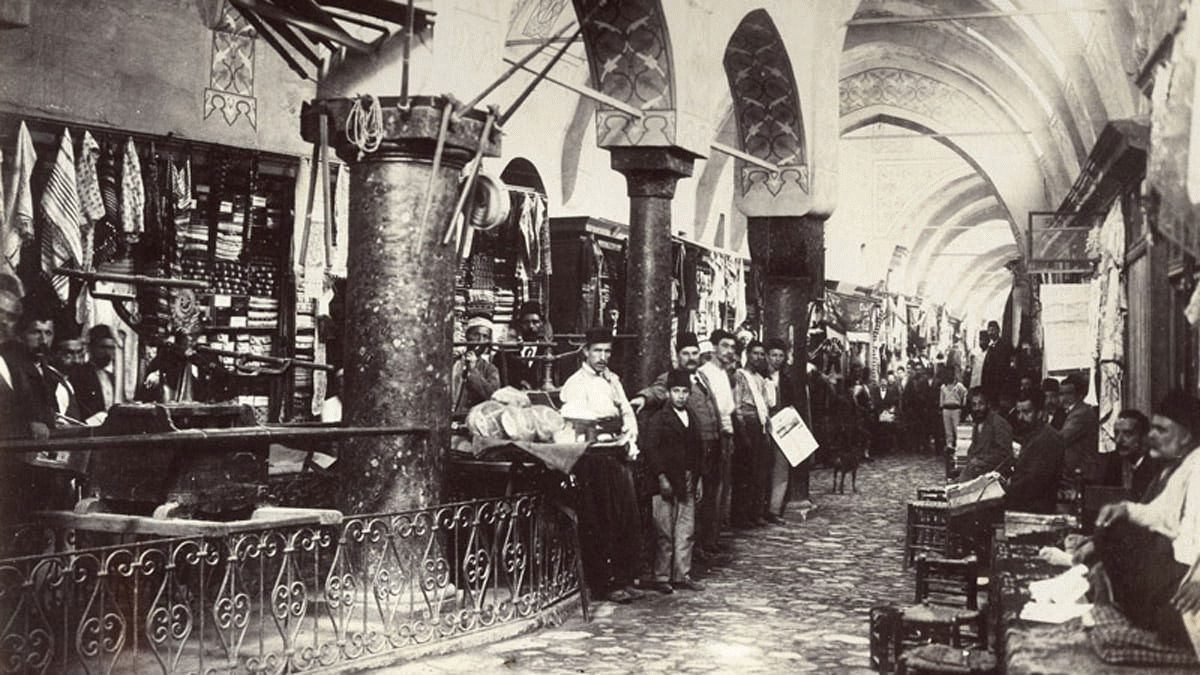 n
front of this market, all the ships of the Black Sea, the
Mediterranean, and almost all the ships of the ancient world would
dock, one after the other, at the port in the Golden Horn, unloading
and loading their cargo.
n
front of this market, all the ships of the Black Sea, the
Mediterranean, and almost all the ships of the ancient world would
dock, one after the other, at the port in the Golden Horn, unloading
and loading their cargo.
I
 n
front of this market, all the ships of the Black Sea, the
Mediterranean, and almost all the ships of the ancient world would
dock, one after the other, at the port in the Golden Horn, unloading
and loading their cargo.
n
front of this market, all the ships of the Black Sea, the
Mediterranean, and almost all the ships of the ancient world would
dock, one after the other, at the port in the Golden Horn, unloading
and loading their cargo.
Goods were bought and sold by all the tradesmen of the ancient world in this bazaar.
Along the Golden Horn, within the coastal walls, there were places providing accommodation for crews and sailors from all nations of the world, and brothels serving them.
On the other side of the Golden Horn, in the Galata region, lived those who managed the money of maritime trade.
Markets for various professionals, formerly located in the Grand Bazaar
Çuhacılar: Broadcloth makers
Örücüler: Knitters
Altuncular : Gold merchants
Astarcılar: Lining fabric merchants
Aynacılar : Mirror makers
Balyacıcılar: Bale merchants
Basmacılar : Chintz fabric merchants
Bitpazarı : Flea market(! :) ) Second hand market
Cebeciler : Gunsmith ( made and repaired weapons, developed gunpowder and prepared war equipment)
Fesçiler : Fez producers and merchants
Halıcılar : Carpet sellers
Kürkçüler : Furriers
Kaşıkçılar: Spoonbills bazaar
Kahveciler: Coffee shops
Kalcılar : Kalcılar (the 'kalcı-ramatçı' workshops that separate gold from the leftover dust of jewelers)
Kalpakçılar : Calpak (fur hood makers)
Karamanlıoğlu : Karamanlıoğlu (market for christian turks living in the Konya region, They were sent to Greece because they were considered non-Muslim in the population exchange)
It's a very sad story. )
Kavaflar : Cavafs (Tradesmen who make or sell cheap, careless and vulgar shoes, belts and wallets)
Kazazlar : Kazaz (ıt is a handicraft made from 24 carat pure gold or thousand carat pure silver wires using braiding techniques.)
Kebapçılar: Kebab shops
Keseciler : Scrub (pouch-shaped fabric used to remove dead skin by rubbing in turkish baths)
Kilitçiler : Locksmiths
Kolancılar : Girdles (flat and wide ties made of textiles, leather, hemp, etc.. Thin belts made of wool or thread, with embroidery on them.)
Koltukçular : Armchair makers
Kuyumcular: Jewelers
Mercan : Coral (those who produce ornaments using coral shells)
Muhafazacılar : Trustees
Püskülcüler : Tassel sellers
Parçacılar : Pieces (those who buy and sell scrap fabric)
Perdahçılar: Polishers
Safrancılar : Saffron merchants
Sahaflar: Secondhand booksellers
Sandalcılar : Sandalcılar (sandal fabric is a natural fabric made from silk and cotton. As a model, we can say that there are roads on it. One of these roads is silk and the other is cotton. However, it also has different patterns, especially the ones with small branches and spots. It is an expensive type of fabric.)
Sarraflar : Money changers
Sepetçiler : Basket makers
Serpuççular : Hat producers, merchants
Tacirler : Merchants guild
Takkeciler: Skullcaps (Skullcap worn by Muslims and Jews during worship.)
Tavukpazarı: Chicken market
Terlikçiler : Slippers
Terziler : Tailors
Tuğcular : Tuğ producers (tuğ, toğ or tuk is the symbol of sovereignty in the state tradition of the turkish and altai peoples. The ponytail attached to the top of the flag is in the form of a pennant made of hair.)
Varakçılar : Gold leaf makers (those who produce gold and silver leaves for decoration)
Yüncüler: Woollens
Yağcılar : Oil merchants
Yağlıkçılar : Yağlıkcılar (those who produce, buy and sell bath towels, etc.)
Yorgancılar : Quilters
Zenneciler : Zenneciler (guild of dancer men who wear women's clothes and pretend to be women)
Zincirciler: Chainsmiths
==================== ====================